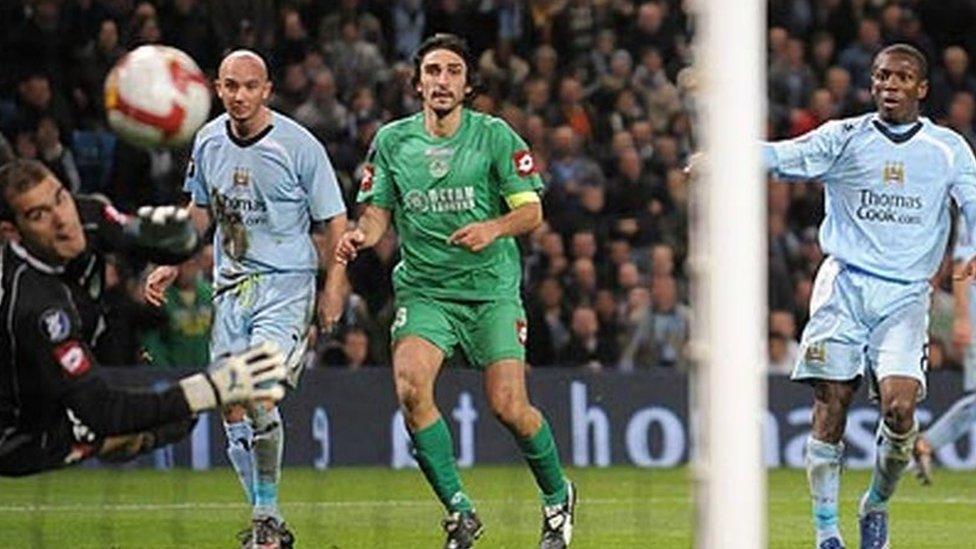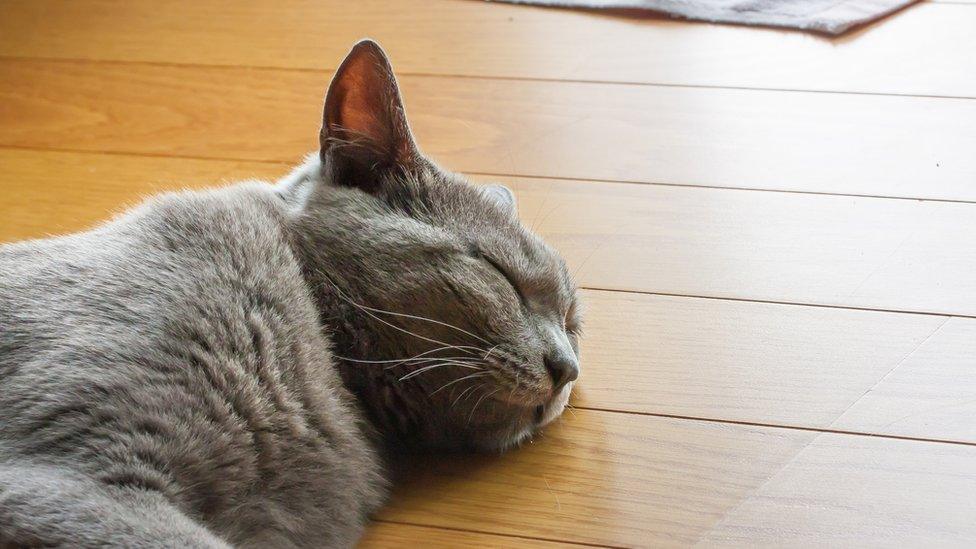Wikipedia hoaxes: From Breakdancing to Bilcholim
- Published

BBC presenter William Crawley: Breakdancing man?
William Crawley is best known as a radio and TV broadcaster with BBC Northern Ireland. But, did you know he's just as comfortable busting a move as breaking a scoop?
"Crawley was one of Northern Ireland's first breakdancers," reads his Wikipedia page, external, and details his membership of the "Belfast B-boys" before a spinal injury ended his promising career.
An absolutely fantastic back story - but one that our man assures us is completely untrue.
This fake Wikipedia entry is one of the millions to plague the site since its game-changing launch in 2001.
The online encyclopaedia's "anyone can edit" philosophy means plenty of mischievous, made-up information has found its way on to the site.
While thousands of volunteer editors, or Wikipedians, try to ensure accuracy and properly cited information, many of these fake facts have fallen through the cracks and been taken as gospel by everyone from university academics to major newspapers and broadcasters.
In the Wikipedia gullibility stakes, no one is infallible.
That means any journalist in any newsroom will likely get a sharp slap across the head from an editor for treating Wikipedia with anything but total scepticism (you can imagine the kicking I've taken over this article).
So, without further busting a move, here's a look at some of the most famous, and some more obscure, Wiki-hoaxes to go from fiction to fact.


French composer Maurice Jarre who died in 2009
Obituary switchery
Ronnie Hazlehurst and Maurice Jarre have a lot in common.
They're both world-renowned composers, whose best-known work appeared as soundtracks to some of the most beloved TV and film of the 20th century.
And they both had their obituaries fall victim to Wiki-hoaxes.
When Hazlehurst died in 2007, external, at the age of 79, several national news outlets - including the BBC and The Guardian - noted that the composer not only created some of the UK's most beloved TV theme tunes, but also wrote the S Club 7 hit, Reach.
Of course, it wasn't true. A mischievous hoaxer had included Reach among the composer's credits in Wikipedia.
Just two years later, tributes in many national newspapers for Maurice Jarre, external carried a quote from the French composer: "One could say my life itself has been one long soundtrack.
"Music was my life, music brought me to life, and music is how I will be remembered long after I leave this life. When I die there will be a final waltz playing in my head, that only I can hear."
If this obituary-friendly quote seemed to good to be true, well guess what - it was made up by Shane Fitzgerald, a student in Dublin.
He said he added the quote after Jarre died to see if he could "influence what newspapers are doing around the world and also that the reliance on newspapers on the internet can lead to some faults".
Can't say we disagree with Sean Fitzpatrick on this one.


Omonia Nicosia, minus 'zany ones', take on Manchester City in 2008
Shoe-hat wearing potato singers
So, we know journalists often turn to Wikipedia when in a research rush under deadline pressure.
Take the Daily Mirror sportswriter who turned to the site when putting together a match preview of Manchester City versus Omonia Nicosia in 2008.
The finished article noted that some fans of the Cyrpiots were nicknamed "the zany ones" and "wear hats made from shoes".
But, the journalist had been the victim of a rascally Wiki edit that not only said the "zany ones" like to "wear hats made from discarded shoes" but also that they "have a song about a little potato" and keep their season tickets in the oven for "safekeeping".
The Press Gazette reported, external that the journalist at the centre of the hoax, David Anderson, admitted: "It's a fair cop."


Wrightbus in Ballymena are best known for building London's new Routemaster buses
Wrong on Wrightbus
Not every Wikipedia hoax is funny or entertaining. One hoax led to panic that over 1,000 jobs in Northern Ireland could be under threat.
In recent years, Ballymena in County Antrim has been hit by a number of major job losses.
The last thing the town needed was more but, in November 2015, workers at bus manufacturer Wrightbus became concerned. The company's Wikipedia page said it had been sold for just over £200m.
The edit was untrue and Wrightbus were quick to dismiss the rumours, external. The hoax, which had caused anxiety to over 1,500 employees, was slammed by a local politician as a "callous act".


Goa: Not the subject of the Bilcholim conflict
The war that wasn't
Most Wikipedia's hoaxes are fairly simple. A minor made-up fact is added to an already obscure article without citation and, boom, it turns up as fact in a newspaper. Job done.
But, the granddaddy of all Wiki Wiki wild wild jests involved a wholly fabricated war backed up by more than 4,500 words, numerous (totally made up) citations and a whole array of academic reference points - the Bilcholim conflict.
According to this extremely elaborate hoax, the Bilcholim conflict took place between 1640 and 1641 when Portugal clashed with the Maratha Empire over the area now known as Goa in northern India.
The entire convoluted conflict was entirely fabricated.
It lived on for more than five years until a studious Wiki editor discovered none of the books cited as references actually appeared to exist.


Ed Wild made up a Wikipedia entry about a fictitious 1970s TV series starring his cat
Olimar-vellous
Of course, most hoaxes do not spread far and wide in news reports or blogs.
Wikipedia itself lists hundreds of the most famous fake entries, external it has deleted, and most are easily ignored - but one lesser known hoax stands out for demonstrating creativity, detail and the love between a man and his pet.
Olimar The Wondercat was not, as stated on its Wikipedia page, a children's TV programme made by the BBC in the 1970s.
It did not run for two series and centre on the magic-powered feline star's run in with nemesis Evil Derek the Dark Dalmatian.
It did not feature episode titles such as 'Scary Aunt Emma' and the short-lived French version did not include Serge Gainsborough as the voice of Olimar.
It was, however, a made-up creation claimed on Twitter in 2013 by Ed Wild.
The cat-loving ruse lasted seven years thanks to its suitably psychedelic 1970s children's TV premise and some nifty photo editing.
RIP Olimar indeed.